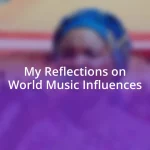Key takeaways:
- Overcoming performance anxiety involves techniques like visualization and focusing on the joy of music rather than the audience’s gaze.
- Maintaining motivation to practice can be achieved by setting small goals, creating a routine, and seeking inspiration from various sources.
- Balancing musical commitment with daily life requires setting boundaries, appreciating quality practice over quantity, and embracing flexibility during unplanned disruptions.
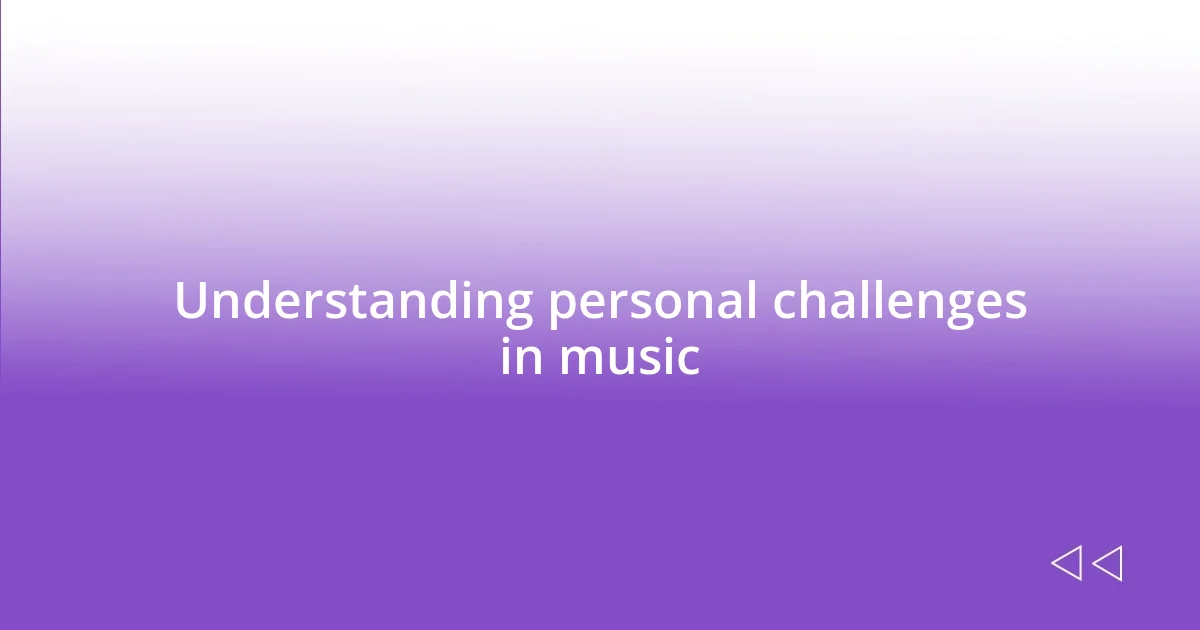
Understanding personal challenges in music
When I think about my challenges in music, one significant hurdle has been overcoming performance anxiety. I still remember my first solo at a school concert; my heart raced so fast that I wondered if everyone could hear it over the music. It made me question whether my love for playing was worth the internal struggle.
Another challenge I often face is the discipline required to practice consistently. There are days when my motivation wanes; I find myself staring at the instrument instead of playing it. I’ve asked myself, “What really matters more today, fleeting distractions or my passion for growth in music?” Those moments force me to reflect on why I started this musical journey.
Then there’s the technical aspect. Learning new techniques can feel like climbing a steep mountain. I recall the frustration of trying to master a complicated piece, feeling overwhelmed. In those moments, I’ve had to remind myself that each small step forward is a victory—something to celebrate, no matter how minor it seems.
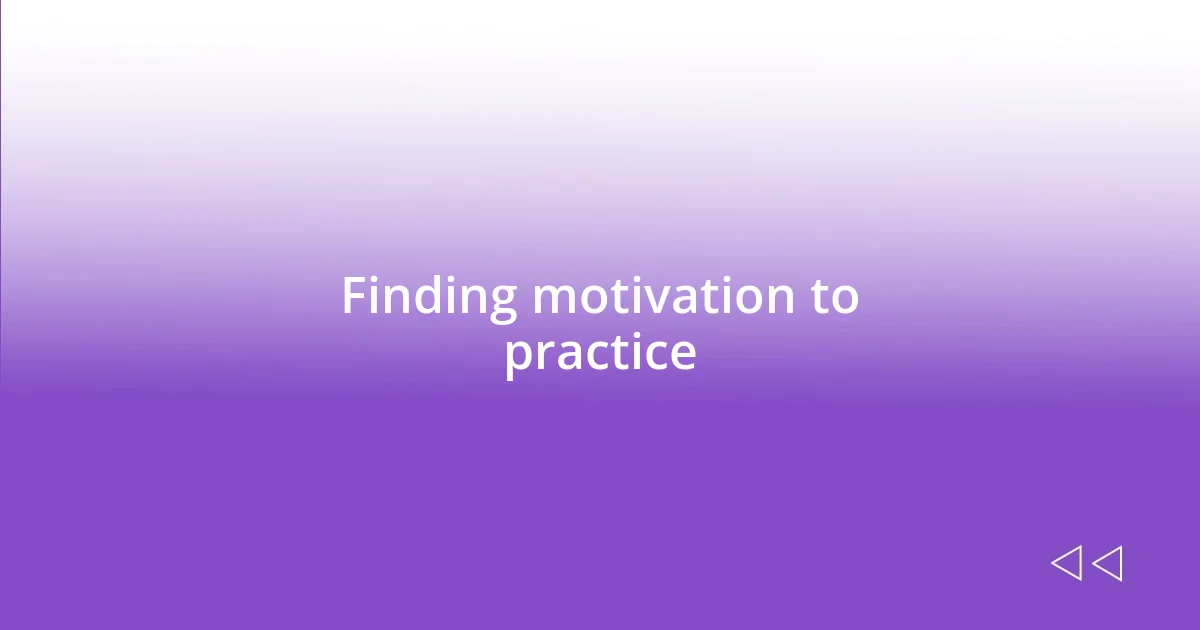
Finding motivation to practice
Finding motivation to practice can often feel like an uphill battle. I remember days when the couch seemed more inviting than my guitar. There’s something disheartening about knowing you should practice but feeling utterly uninspired. In those moments, I try to reconnect with what sparked my initial passion for music.
Here are a few strategies that help me reignite my motivation:
- Set small goals: Instead of tackling an entire piece, I focus on mastering just a few bars.
- Create a routine: I find that consistency breeds motivation. Sticking to a set practice time helps me build a habit.
- Seek inspiration: Listening to my favorite artists or attending performances can reignite my passion.
- Mix it up: I switch between different styles or instruments to keep things fresh and exciting.
- Celebrate progress: No matter how small, acknowledging each achievement makes the practice feel worthwhile.
Finding motivation to practice is often about finding joy in the journey, rather than just the destination.
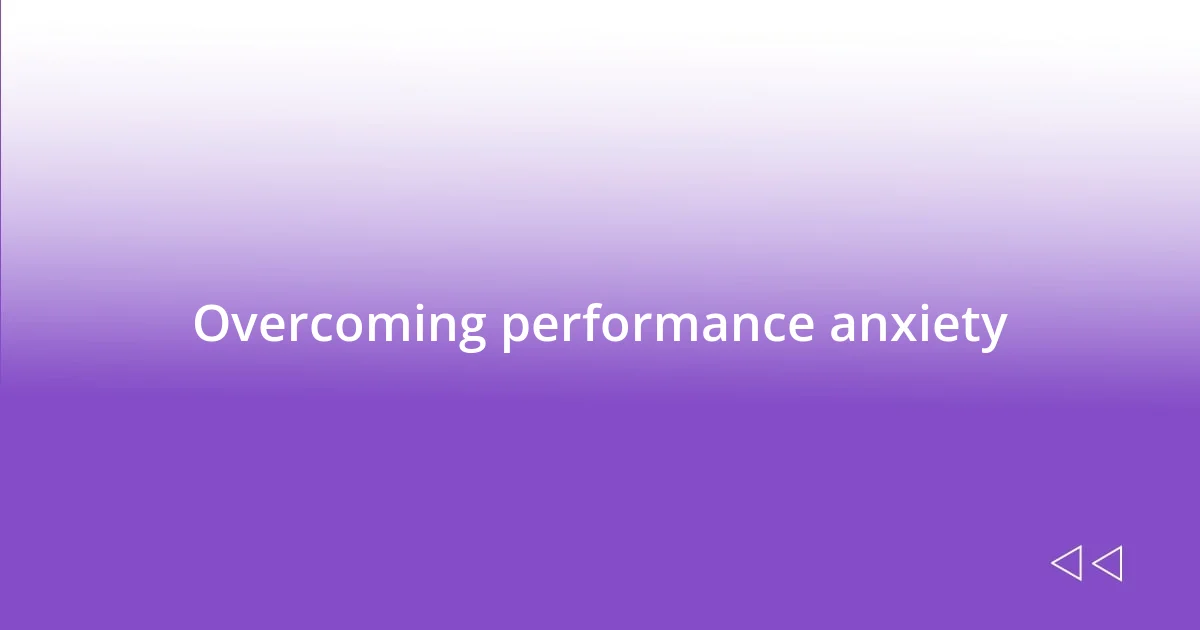
Overcoming performance anxiety
Performance anxiety can be quite a complex issue for many musicians, including myself. I recall standing backstage, waiting for my turn to perform, feeling as though time had stopped. The adrenaline rush was overwhelming, and my mind flooded with “What if I mess up?” In those moments, I had to remind myself that every performer has felt these jitters, and embracing the nerves can sometimes channel that energy into a more powerful performance.
One technique that I’ve found particularly helpful is visualization. Before stepping on stage, I close my eyes and picture myself playing confidently and flawlessly. It may sound a bit cliché, but this mental rehearsal makes a significant difference. It’s fascinating how our minds can set the tone for our physical reality, turning anxiety into excitement. Practice can also include performing in front of friends or family to simulate a real audience, which helps me acclimate to the pressure.
When I finally take the stage, I’ve learned to focus on the music rather than the audience’s gazes. I often remind myself, “This moment is for me—my passion, my joy.” Shifting the focus back to the joy of making music significantly eases my anxiety. Remember, it’s perfectly normal to feel nervous, and I’ve realized that these feelings can be transformed into fuel for an unforgettable performance.
| Strategies | Personal Reflection |
|---|---|
| Visualization | Picturing success has helped me turn nerves into excitement. |
| Simulated Performances | Practicing in front of friends creates a comfortable environment to ease my fears. |
| Focus on the Music | Shifting my attention to the joy of playing diminishes the pressure I feel. |
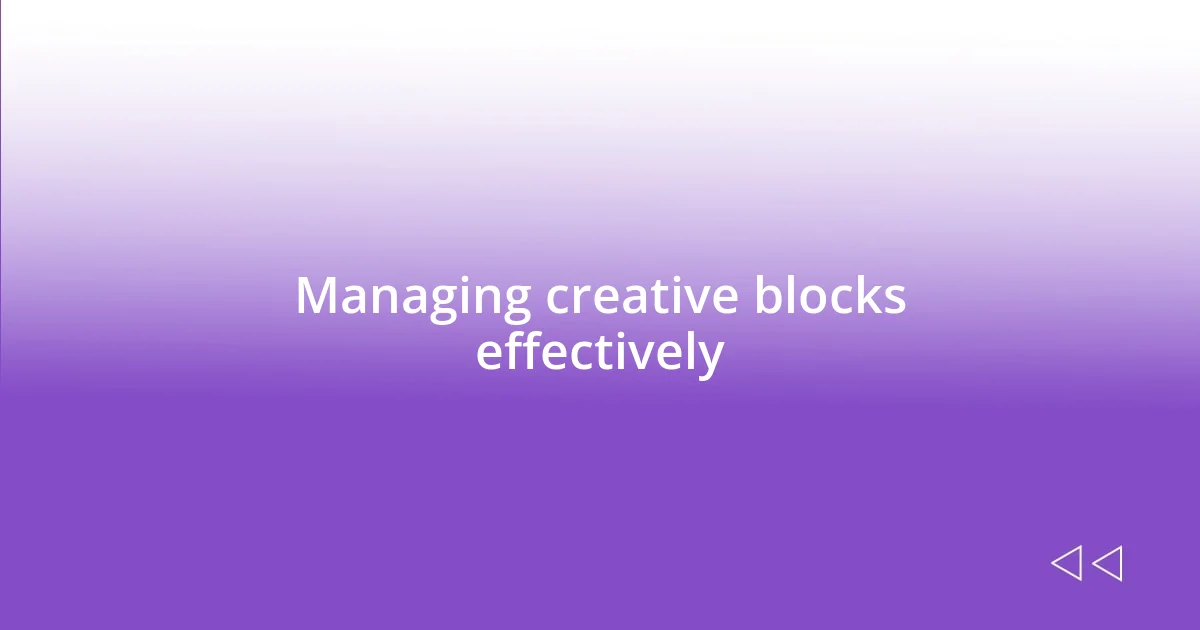
Managing creative blocks effectively
Creative blocks can be incredibly frustrating, and I’ve certainly faced my fair share of them. I remember a particularly dry spell when ideas just wouldn’t flow. It felt like staring at a blank canvas, surrounded by an overwhelming silence. In those moments, I’ve discovered that stepping away from my instrument can actually work wonders. A walk in nature or simply cooking a meal often stirs my creativity in unexpected ways.
One technique I often resort to is to change my environment. I recall one time when I sat at a café instead of my usual practice space. The sounds of clinking cups and soft chatter sparked something inside me. It reminded me that inspiration can come from the most mundane places if we just change our perspective. Have you ever noticed how different settings can shift your mood? I think it’s crucial to embrace those shifts because they can bring new ideas and solutions to creative blocks.
Additionally, I find solace in experimenting without pressure. I pick up my guitar and just play without the expectation of creating something “great.” This frees me from the burden of perfection. When was the last time you allowed yourself to create for the sheer joy of it? Many of my best ideas emerged during these carefree sessions, reminding me that creativity often thrives when we let go of self-judgment.
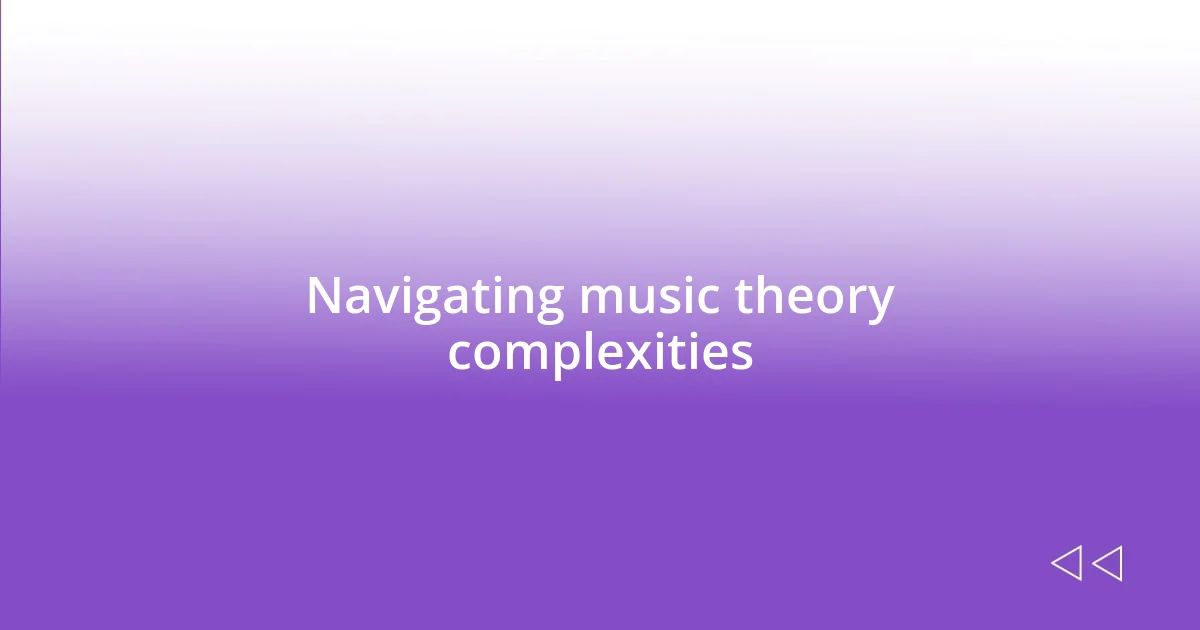
Navigating music theory complexities
Navigating music theory complexities can feel like unraveling a tangled web. I remember sitting in my first music theory class, overwhelmed by the flood of terms and concepts—time signatures, key signatures, scales—each seemed like a puzzle that I couldn’t quite piece together. Has anyone else felt that tight knot of confusion in their stomach when confronted with new theory? I certainly have.
As I dug deeper into theory, I discovered that visualization played a key role in understanding these complexities. For instance, I began to draw out scales on paper, connecting notes visually. This not only made the information more digestible but also helped me recognize patterns that previously eluded me. Have you ever tried mapping out your ideas visually? It could change the way you approach learning!
Some of the biggest breakthroughs in my understanding have come from teaching others. When I explain concepts like chord progressions to a friend, it forces me to articulate my thoughts clearly. Suddenly, what once felt like a chaotic jumble becomes a harmonious flow of ideas. It’s fascinating how sharing knowledge can solidify your understanding. Have you ever experienced that moment when teaching others becomes a learning journey for yourself? It’s an incredible realization that navigating these complexities can be less daunting when you’re not doing it alone.
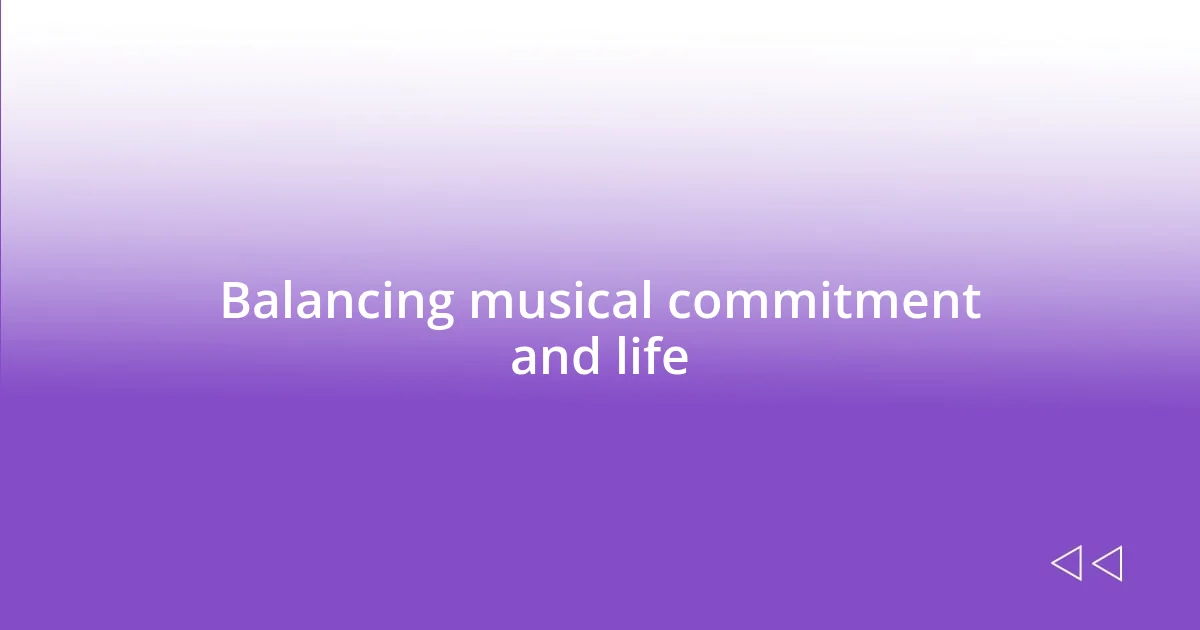
Balancing musical commitment and life
Finding a balance between musical commitment and daily life presents a real challenge that I’ve wrestled with over the years. Some days, I feel torn between my longing to practice for hours and the responsibilities that beckon. For instance, there are nights when I stare at my guitar, feeling that strong urge to dive into creative exploration, only to be interrupted by the reality of laundry, a work deadline, or family obligations. It can be disheartening, don’t you think?
One of the most effective strategies I’ve embraced is setting clear boundaries. I distinctly remember one weekend when I committed to a minimalist practice routine—just 30 focused minutes each day. This small change made me appreciate those moments more fully. Has anyone else found that sometimes less truly is more? By prioritizing quality over quantity, I discovered that even brief, concentrated sessions could yield meaningful growth in my musicianship while still allowing space for my other life commitments.
Another important insight is the need for flexibility. I recall a time when an unexpected family event turned my week upside down, and I couldn’t stick to my practice schedule. Initially, I felt overwhelmed and frustrated, but I reminded myself that music would always be there for me to return to. Life’s unpredictability can be a gift, offering new perspectives and inspiration. How do you approach unplanned disruptions? I’ve learned to embrace these moments as vital threads in the tapestry of my musical journey, recognizing that balance means adjusting rather than resisting.











